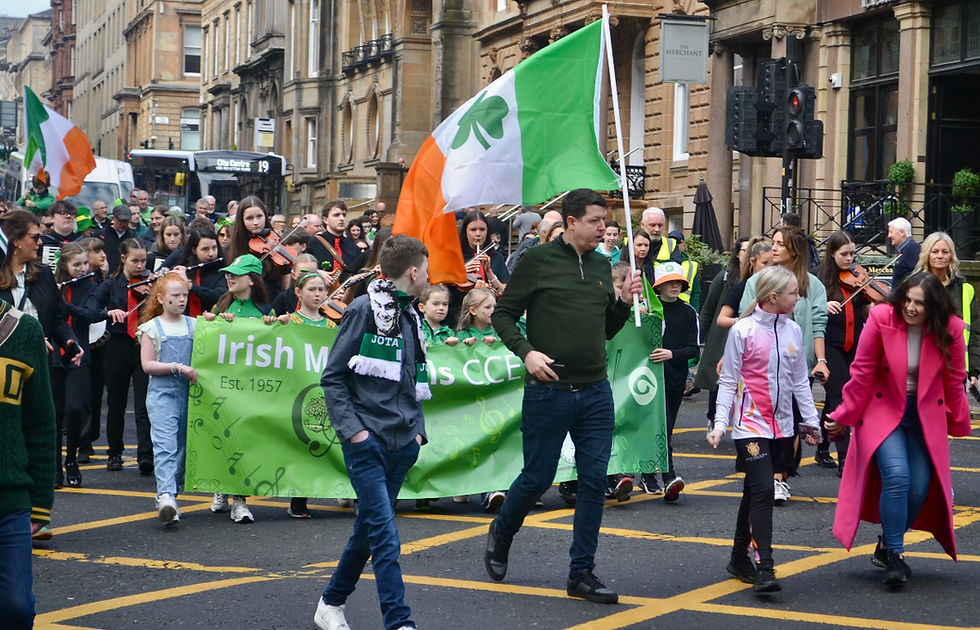Not enough care for our community
- Dan McGinty
- Sep 17, 2024
- 3 min read
Updated: Oct 25, 2024

THE UN Committee on the Elimination of Racial Discrimination made specific mention of the Irish community here in their report on the United Kingdom.
The report followed a review during which communities across the UK made submissions to highlight the issues they face for consideration, as well as direct contact with the governments of the UK.
The report contained a call to the Scottish Government to begin engagement with the Irish community in Scotland—an issue which our readers will be all too familiar with—and marks the first time such a recommendation has been made.
The Scottish Government now find themselves in the unenviable position of having their current approach criticised by the UN body tasked with identifying urgent points of action to countries around the world.
Concerns and recommendations
“The committee is also concerned about reports of racist incidents and ethnic and religious prejudice against Irish persons in Scotland [and] also recommends that the State party, particularly the Government of Scotland, engage with relevant stakeholders, in particular members of the Irish community, to develop measures to effectively address ethnic and religious prejudice in Scotland,” the report said.
The report also set a deadline of April 2028 for a review of the document, which identified numerous issues in the UK generally and for each of the devolved governments individually. It marked one of the most significant victories the Irish community in Scotland has had, and places them firmly within the sphere for a human rights based approach to equality.
Taking action
Despite the victory, it remains telling that such a clear recognition of the position of the Irish in Scotland came from an international body, and the challenge for the Irish community will be to ensure that the government acts on the unequivocal
recommendations of the UN Committee on the Elimination of Racial Discrimination.
“The Scottish Government are now obliged to undertake the kind of real and meaningful engagement with our community which we have been calling for for decades and particularly strongly since 2018,” Call It Out said in reaction to the news.
“The explicit and written refusal of the Scottish Government to include the Irish community, among others, in the Anti-Racist Observatory—the body to which they are franchising out their race equality obligations—is now starkly at odds with their duty to act on the recommendations of UNCERD.”
A new future or more frustration?
The prospect of a new and meaningful attempt at engagement with the Irish community presents a new future for the Irish community in Scotland, which has long fought against indifference and ignorance from those in authority, with the
convenient narrative of the sectarianism agenda presenting a huge obstacle for progress.
With an external voice with the authority of the UN now recognising the issues we face and calling on the Scottish Government for change, the multi-generational Irish community now has an opportunity to speak for itself and bring our priorities forward to the government through engagement.
Such issues in the past presented great frustration, as witnessed during the Covid-19 pandemic, and Call It Out referred to that unedifying episode in their reaction along with the new future of engagement should the Scottish Government react appropriately to the recommendations.
“Followers of our site or readers of The Irish Voice will be aware that a statistical report provided by the National Records of Scotland—the government body responsible for the census—for the Expert Reference Group on Covid-19 deaths and ethnicity uncovered the fact that the Scottish Government regards the data on the multi-generational Irish community in Scotland as less than ‘robust’ and used this as the justification for ignoring their own figures which showed that the Irish were, absolutely and proportionately, the ethnic group with the most Covid-19 deaths,” Call It Out said
“Moreover, when asked by Call it Out what they planned to do to make the data ‘robust’ we were told ‘they had no plans.’ Put simply this means that the refusal of the National Records of Scotland to take action to ensure that credible data on our community in all areas of life is collected is directly in conflict with the UNCERD recommendation.
“Call it Out welcomes this report and its associated recommendations and will, after due consideration, be approaching the Scottish Government to ascertain how and when they hope to comply with them.”
PIC: ANDREW BOWDEN







Comments